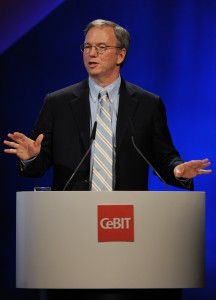Google, web security and privacy in spotlight at CeBit 2012

Google can't seem to get out of the government's glare these days.
Yesterday, Executive Chairman Eric Schmidt launched the annual CeBit technology conference with heads of state from Germany and Brazil. During the webcast, presenters pounded on the show's key theme --managing trust -- as a core concern as more data and applications -- and consumers' personal info -- end up in the cloud.
If show organizers expected the chairman to comment on the much publicized European concerns about Google's new privacy policies, they would be mistaken.
In a semi subtle affront, Google's top dog chose not to address consumer privacy concerns but rather the power of the Internet and technology to challenge governmental authority and empower the meekest to overcome state oppression.
Schmidt also said the worldwide web -- which has yet to reach five billion of the world's seven billion human inhabitants -- will increasingly connect people by passion and interest rather than by loyalty to nation or other physical determinants.
He also suggested that coders and digital enterprises ( ie Google and Facebook) are creating the tools used by dissidents and activists to overcome government oppression and emphasized that "developers will be the engineers of human freedom."
Score 1 for the company in its gigantic battle against government regulators.
Still, it's not clear if that same openness and transparency Google backs extends to the operators of the the infrastructure-- many of which are private sector.
In her following keynote, German Chancellor Dr Angela Merkel agreed with the Google Chairman about the seamlessness of this Intelligent infrastructure and noted that's why it's so important that the products used to create the network are scrutinized closely for reliability, that the data sent in the connected space is protected and consumers can rely on the security model.
So even as the European economy faces another round of crises, and the Euro's fate hangs in limbo, European powers will be sure to ensure that the profiteers of the intelligent infrastructure are held accountable.
Got it. Google, 1, Europe, 1.
Meanwhile, across the pond, Google found itself in the limelight again.
This time, however, the spotlight was aimed at the company's open source Chrome web browser, rather than on its controversial privacy settings -- which also has engendered the interest of U.S. officials in recent weeks.
Last week, the California Internet software giant released a video of US Secretary of State Hillary Clinton announcing, well, celebrating, the release of the Chrome browser to state department employees in a recent town hall meeting. "I'm happy to announce that Google Chrome will be deployed worldwide on Feb 14th," Clinton said to a cheering group. (IE 8 will be deployed on March 20)
Madam secretary also told those employees that Chrome is "intended as an optional browser" and may not work as well as Internet Explorer on some internal government web sites but that its deployment should "greatly improve" surfing on external web sites.
